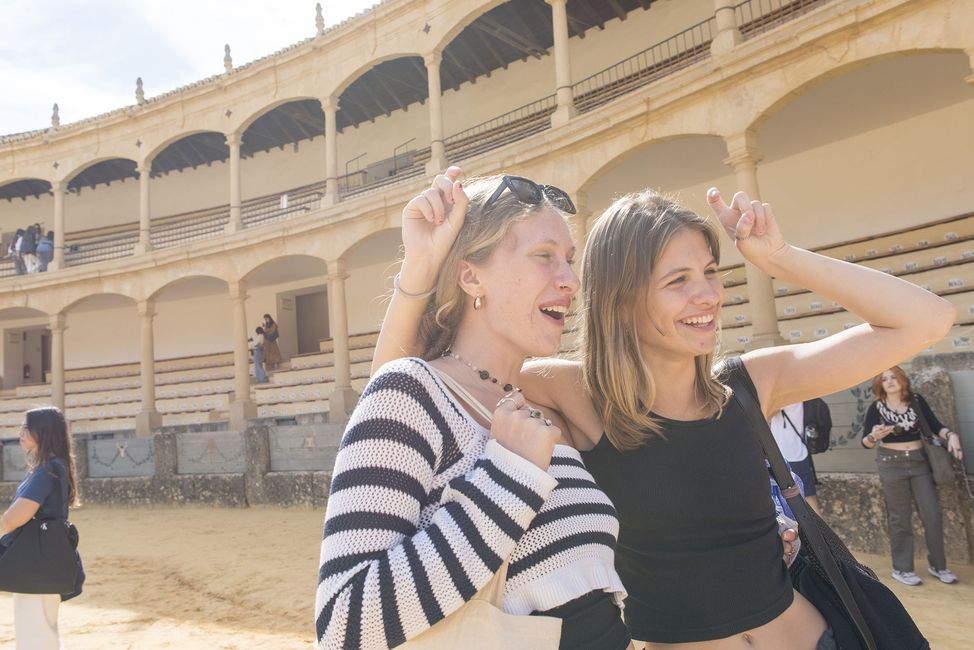Top 7 Safety Myths That Stop Students from Going on a First Year Abroad
Thinking about studying abroad directly after high school but feeling nervous?
You’re not alone. Both students and parents worry about study abroad safety, cultural adjustment, and a million “what-ifs.”
However, many common anxieties around safety are based on myths and these can prevent you from experiencing the academic benefits of studying abroad. Let’s bust a few of these myths!
1. “If I don’t know the language, I’ll be lost the whole time.”
There are a few reasons why this one isn’t entirely true. But first, let’s acknowledge what is true about it. Yes, if you go to a foreign country where the native language is not English, you’ll be fully immersed in the local language—and that’s a good thing, especially if one of your goals for studying abroad is language learning.
Knowing that doesn’t completely erase the worry of getting lost or feeling left out because your fluency is subpar. However, here are some reasons why you can relax:
- Many people will speak English. This can vary depending on where you study, but English is a common language in our globalized world.
- A structured program provides a built-in community. You’ll have a group of English-speaking peers navigating the same study abroad experience as you, making it easy to connect and feel supported.
- You’ll pick up the local language quicker than you think. Immersion is the most effective way to learn a language. You’ll be surprised how quickly you can communicate in everyday situations, even if it’s just with key phrases at first.
- Technology is your best friend. Tools like Google Translate are game-changers, and countless apps help with everything from translation to public transportation. Smartphones make it easier than ever to be independent, even in a foreign country.
2. “Other countries are more dangerous than the U.S.”
Safety is a valid concern, but risks exist everywhere—including at home. Many countries have lower crime rates than the U.S., and structured study abroad programs like First Year Abroad are designed to prioritize student safety with comprehensive measures in place.
CIEE goes above and beyond to keep students safe. Our data-driven risk management team assesses potential risks in each location, tailoring safety practices to the area's specific needs. We also have on-the-ground staff, often composed of locals who know the area intimately and are prepared to provide guidance and support.
If an issue does arise, CIEE provides international student support. Our team is ready to assist with immediate needs while addressing academic continuity, financial implications, and family communication.
Learn more about CIEE’s Health, Safety, and Security.
3. “Traveling alone isn’t safe.”
It’s true that traveling alone comes with more risks. Still, you can take precautions to ensure your safety. Researching your destination ahead of time, avoiding unsafe areas, and staying aware of your surroundings are key steps.
Joining a structured study abroad program significantly reduces the risks of traveling alone. With CIEE, you’ll be part of a community of other students sharing the same experience, and you’ll benefit from comprehensive safety measures.
4. “Public transportation abroad isn’t safe.”
Public transportation in a new country can feel overwhelming, but it’s often efficient, safe, and widely used by locals. In many countries, especially in Europe, public transit systems are far beyond what’s available in most U.S. cities. Plus, structured study abroad programs provide students with local orientation, teaching you to navigate buses, trains, and subways confidently.
5. “It will be difficult to ask for support from my host family.”
It’s natural to feel unsure about living with strangers in a new country. However, host families in CIEE's network are carefully-selected host families who are vetted to ensure safety and compatibility.
Many students leave their study abroad experience feeling like the best part of their program was meeting a second family across the world.
6. “Natural disasters or emergencies will leave me stranded.”
First Year Abroad programs provide comprehensive contingency plans for in-country emergencies. CIEE monitors local conditions closely, with local staff on the ground trained to respond to crises.
First Year Abroad students receive pre-departure and on-site guidance about what to do in emergencies, so they’re never left unprepared.
7. “It will be difficult to get medical care.”
Worries about accessing medical care abroad are common, but First Year Abroad is designed with 24/7 on-the-ground support to help students navigate the healthcare system in their host country, from finding a doctor to translating medical terms. A First Year Abroad program includes comprehensive international student travel insurance as part of tuition.
With these safeguards, you can feel confident they’ll be well cared for abroad.
First Year Abroad Is a Safe and Unforgettable Experience
Spending your first year of college abroad with CIEE First Year Abroad is a unique chance to jumpstart your college journey. Don’t let anxiety stop you!
With amazing global locations, First Year Abroad offers immersive cultural experiences, college-level courses, and a supportive environment. You’ll live in secure, have high-quality housing, and benefit from CIEE’s industry-leading safety measures.



